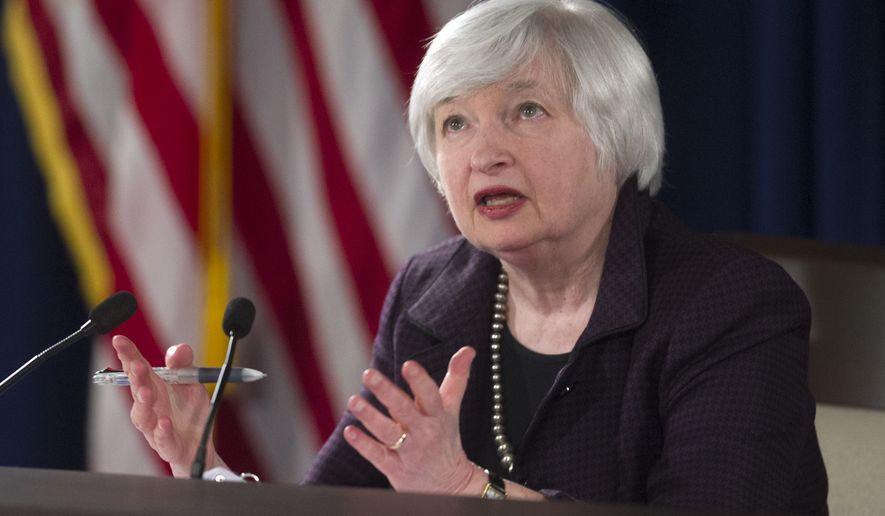After years of being blocked by Democratic leader Harry Reid, the Senate will finally get a chance next year to vote on legislation to force a broad audit of the Federal Reserve’s decision-making.
Once championed in Congress by former Rep. Ron Paul, the push to force the country’s central bank to undergo a full audit has been picked up by his son, Sen. Rand Paul, and others, and has the backing of the leader of the new Republican majority, Sen. Mitch McConnell, Kentucky Republican, whose office says the legislation will earn a floor vote.
But despite overwhelming support in the House, where the legislation has twice passed, the bill is not a sure thing in the Senate, and the Fed itself is pushing back. Chairwoman Janet L. Yellen said earlier this month the Fed remains opposed to stricter oversight of its monetary policy decisions, and Reuters reported she and other Fed officials are lobbying Capitol Hill to drop the audit push.
“Back in 1978 Congress explicitly passed legislation to ensure that there would be no GAO audits of monetary policy decision-making, namely policy audits. I certainly hope that will continue, and I will try to forcefully make the case for why that’s important,” Ms. Yellen told reporters at a press conference two weeks ago.
For supporters in Congress, the fight is a matter of constitutional prerogatives and good governance. They argue that President Obama’s 2009 Recovery Act, which totaled $800 billion in spending and tax cuts, was dwarfed by the trillions of dollars of stimulus the Federal Reserve oversaw.
They’ve had luck in the House, where legislation calling for an audit has passed twice, including most recently in September on a 333-92 vote. All but one Republican, and more than half of the Democrats in the chamber, voted for the legislation.
PHOTOS: Celebrity deaths in 2014
But Mr. Reid, Nevada Democrat, refused to give the bill floor time in the Senate, bottling it up in both 2012 and 2014.
Norm Singleton, vice president of policy at Campaign for Liberty, Ron Paul’s political organization, said that was striking because, in 2010, Mr. Reid had seemed to throw his support behind doing an audit.
Mr. Reid’s side suffered huge losses in November’s elections, with the GOP netting nine seats — enough for a 54-46 majority, delivering control over the floor schedule to Mr. McConnell and undercutting Mr. Reid’s power.
“His refusal to bring popular legislation like ’Audit the Fed’ to the floor is a major reason why he’s being demoted to minority leader,” said Mr. Singleton, who spent years as Mr. Paul’s legislative director in the House. “The change in Senate leadership does present us with the best opportunity yet to get a stand-alone vote on ’Audit the Fed.’”
Still, he said they aren’t taking anything for granted, particularly after the report that Fed officials are quietly lobbying against more oversight.
“This is popular with 75 percent of the American people, but it’s not popular among Wall Street; it’s not popular among banks; it’s not popular among foreign central banks,” Mr. Singleton said. “These hold a fair amount of sway among both parties, so just to say that a change in party necessarily means we’ll be able to move Audit the Fed it’s better odds now than we’ve had before, but it’s not a slam dunk.”
SEE ALSO: Obama fights lame-duck label, chimes in on hot-button social issues
Sergio Gor, a spokesman for Sen. Paul, the former congressman’s son and current Kentucky senator, said they’ll make sure the bill is available for the new Congress.
“It will be among the first pieces of legislation to be introduced as soon as the new Congress convenes in January,” Mr. Gor said. “Transparency at the Federal Reserve remains a top priority for Senator Rand Paul.”
Congress established the Federal Reserve nearly a century ago. The system, which consists of a board of governors and 12 regional banks, acts as lender of last resort to the country’s banking system, and it is charged with fighting inflation and with promoting economic growth and employment.
The interest rates it sets have a direct impact on the rates that banks charge consumers, but Congress shielded some of the board’s decision-making from view in order to give the agency independence.
Now, after the recent financial collapse, many lawmakers have begun to question the Fed’s decisions and want a closer look at why it has taken those steps.
The audit legislation would grant the Government Accountability Office, which is Congress’s chief investigative arm, the power to retroactively review — though not actually reverse — the Fed’s decision-making, particularly on monetary policy.
Ms. Yellen already has to testify regularly to Congress about decision-making, and reports of meetings are released years after the fact. But Ms. Yellen and her defenders say giving the GAO audit powers could amount to having their decisions scrutinized almost in real time, which they say could influence the closed-door deliberations by the Fed.
“If board members know that their statements may become public, they may be inhibited from speaking candidly about the economic trends they are observing or the monetary policies they believe would best respond to current conditions,” Rep. Elijah E. Cummings, Maryland Democrat, said in leading the fight against the bill in September.
Mr. Cummings said if the GAO were given power to audit the Fed, members of Congress could use their own ability to request certain audits as a way of influencing the board’s deliberations.
Congress has approved several more limited audits of the Fed, including one stemming from the Dodd-Frank legislation written in the wake of the Wall Street collapse. That audit, reported in 2011, found the Fed repeatedly invoked emergency powers to expand its lending in 2008 and 2009, including making major loans to prop up the housing market.
• Stephen Dinan can be reached at sdinan@washingtontimes.com.




Please read our comment policy before commenting.